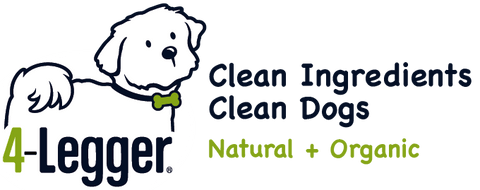Is Aloe Vera Toxic to Dogs?
Last week we had two separate customers ask us if the aloe vera in our products is safe to use on their dogs.
Clearly there is something going around on the internet; so we need to take the time to address this concern.
Let's start with the most important question.
Will your dog get sick from the aloe in 4-Legger's Organic Dog Shampoo?
No. The compounds responsible for the laxative effect of the aloe plant are filtered out of our aloe. It is safe and non-toxic even if licked and ingested.
Can your dog get sick from eating the aloe plant?
If your dog eats enough aloe plant they can get sick as there are components in the leaves that act as laxatives causing diarrhea and other tummy upsets.
Aloe Vera Has a Long History Of Safety
Aloe has long been known as the great healer - excellent for soothing burns, healing cuts, and moisturizing skin. It has often been referred to as the medicine plant as it is so versatile and beneficial for so many body systems - from skin to hair and internal use.
In Chinese medicine, the inner part of the aloe plant is considered a yin tonic - meaning it helps to nourish, moisten, and balance tissues.
The Structure of the Aloe Plant
To learn what part of the aloe is toxic, let's take a look at the leaves.
The green rind (also called the cuticle) of the aloe leaf has a hard, waxy exterior about 15 cell layers thick.
 The vascular bundles just below the cuticle contain tubes of xylem that transports water and other nutrients from the roots to the leaves and phloem that transports food from the leaves to the rest of the plant.
The vascular bundles just below the cuticle contain tubes of xylem that transports water and other nutrients from the roots to the leaves and phloem that transports food from the leaves to the rest of the plant.
The long narrow tubes contain the aloe juice, a bitter, sticky yellow sap that drains from the larger tubules when a leaf is cut. The center of the leaf contains the mucilage or gel.
The aloe juice contains latex as well as aromatic organic compounds called anthraquinones.These are naturally occurring compounds found in herbs that are used to naturally (and safely) relieve constipation when used as directed.
Aloin is the most commonly known anthraquinone compounds. At high doses (when not used as directed), the anthraquinones can cause toxicity symptoms that include nausea, vomiting, diarrhea, bloody diarrhea, dizziness, abdominal pain, cramping, and in severe cases, kidney damage.
Some anthraquinones have been shown to be carcinogenic when taken orally over long periods of time. It is logical that it would cause issues as the body was not designed to take high doses of laxatives over long periods of time. It puts undue stress on the body's systems and causes the cells to go haywire.
4-Legger's Ingredients Are Superior
4-Legger's aloe is grown organically - our aloe is never in contact with herbicides or pesticides. After harvesting, the aloe is filtered using a charcoal filtration process (called decolorization) to remove the anthraquinones, latex and the naturally occurring bacteria.
The resulting "decolorized" aloe is safe and non-toxic and highly beneficial. In 4-Legger's organic dog shampoo it helps to relieve dry and itchy skin while nourishing the skin with vitamins and minerals to keep your dog's skin soft and their hair strong and healthy while keeping your fur baby safe!





